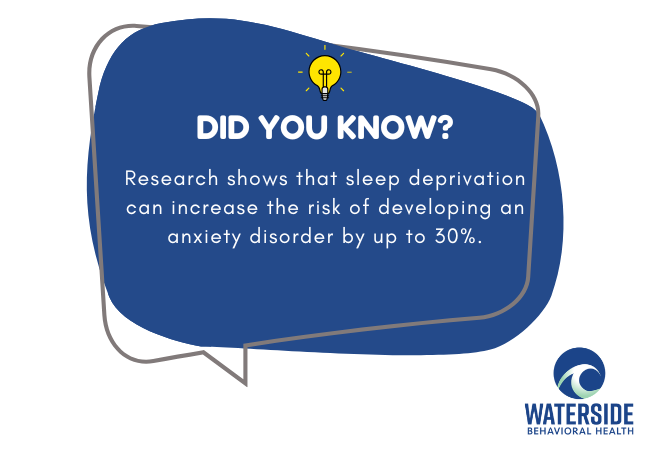Chronic anxiety doesn’t knock before it enters. It doesn’t wait for a convenient time to show up. Instead, it seeps into the quiet corners of your life—your relationships, your routines, your sense of peace—and builds itself a home. For many, it’s more than a fleeting worry or an isolated panic attack. It’s a persistent, gnawing feeling that something is always wrong, even when everything seems fine on the outside.
Living with chronic anxiety can feel like being trapped in a loop. You may try to power through the symptoms with distractions, keep a brave face at work or around friends, or rely on temporary fixes. But when the cycle keeps returning—when the tight chest, racing thoughts, or constant dread never fully leave—it becomes clear that deeper healing is needed.
Real relief is possible. But it doesn’t come from surface-level strategies alone. It requires a layered, personalized approach that addresses the root causes of anxiety, not just the symptoms. At Waterside Behavioral Health, we understand that the journey toward long-term recovery from anxiety is not linear, but we also know that with the right support and environment, transformation is absolutely within reach.
Understanding Chronic Anxiety
Chronic anxiety is different from occasional nervousness. It’s not confined to specific events or temporary stressors. Instead, it becomes part of a person’s daily baseline—a feeling of being perpetually on edge, anticipating the worst, or fearing things that may never happen. You might constantly worry about your health, fear something bad will happen to loved ones, or feel physically tense even in moments of calm.
This kind of anxiety can originate from a variety of factors. For some, it’s genetic. For others, it might stem from early life experiences, long-term exposure to stress, or unresolved trauma. Often, it’s a combination of all of these. Chronic anxiety doesn’t just affect your mind; it impacts your entire nervous system. You might struggle with sleep, digestion, muscle tension, or frequent headaches.
The long-term effects can be just as damaging as physical illness, and yet people often try to manage it in silence. But anxiety isn’t a weakness—it’s a signal. It’s your mind and body trying to tell you that something needs healing.
The Role of Therapy in Lasting Relief
When you’re caught in an anxious cycle, it can be hard to see the way out. But therapy can be the flashlight in that darkness. One of the most effective evidence-based approaches for anxiety is cognitive-behavioral therapy in Massachusetts. CBT helps individuals identify and shift the distorted thought patterns that keep anxiety alive.
For example, if your brain constantly jumps to worst-case scenarios or views situations as black and white, CBT helps you challenge those automatic thoughts and develop more balanced, realistic perspectives. Over time, this reframing rewires your responses to triggers and helps reduce both emotional and physical symptoms of anxiety.
Another highly effective method, especially for those with chronic or emotionally reactive anxiety, is dialectical behavior therapy in Massachusetts. DBT teaches emotional regulation, mindfulness, and distress tolerance—skills that are essential when anxiety is fueled by intense emotions or impulsivity. People who struggle with anxiety often find it difficult to manage overwhelming feelings, and DBT offers clear, structured tools to handle those moments without shutting down or spiraling.
These therapeutic methods are not about “fixing” you. They’re about equipping you with the tools and insight to understand yourself better and respond to your anxiety in a healthier, more empowered way.
The Link Between Anxiety and Depression
Many people living with chronic anxiety also experience symptoms of depression. It’s a painful combination: the restlessness and fear of anxiety, paired with the numbness and hopelessness of depression. These two conditions often feed off each other. The exhaustion from constantly being in fight-or-flight mode can lead to emotional burnout, while the hopelessness of depression can make it even harder to manage anxiety symptoms.
This is why it’s important that anxiety treatment also considers co-occurring conditions. At Waterside Behavioral Health, we understand that healing one without the other can lead to incomplete recovery. Depression therapy in Massachusetts plays a crucial role in restoring hope, motivation, and emotional resilience in individuals managing both anxiety and depressive symptoms.
Treating both conditions simultaneously ensures that individuals are supported holistically—not just in moments of panic, but in the quiet aftermath when fatigue and emotional shutdown creep in.
How Trauma Contributes to Chronic Anxiety
For many individuals, anxiety didn’t start out of nowhere. It often has roots in unresolved trauma. Traumatic experiences—whether they happened in childhood or later in life—can leave the nervous system stuck in a heightened state of alertness. Even after the danger has passed, your body may still react as though it’s under threat.
This is why trauma-informed care is essential to long-term anxiety recovery. Through trauma therapy in Massachusetts, individuals learn to process and release painful memories in a safe, supportive space. The goal isn’t to relive trauma, but to gently explore how it has shaped your emotional responses and find new ways to experience safety in your body and mind.
Trauma therapy also recognizes that trauma doesn’t just live in the mind—it lives in the body. That’s why somatic practices, grounding exercises, and mindfulness-based techniques are often incorporated. These tools help regulate the nervous system and build a sense of internal calm that’s been missing for far too long.
Building a Life Beyond Anxiety
Therapy is a powerful catalyst, but healing continues in the spaces between sessions. That’s where lifestyle changes become essential. People with chronic anxiety often benefit from routines and environments that support emotional balance. This could mean creating better sleep hygiene, moving your body regularly, eating in a way that supports mental clarity, and nurturing relationships that bring you peace instead of pressure.
It also means learning to notice your early warning signs—maybe your shoulders tense up, or your thoughts start racing—and taking action before anxiety gains momentum. This kind of self-awareness and self-care is learned, practiced, and strengthened over time.
Many people find that they need a structured environment at the beginning of this journey—somewhere they can pause, reset, and learn new tools without the chaos of everyday life interfering. A mental health treatment center in Massachusetts can provide that kind of safe and supportive space. In a dedicated setting, individuals can focus fully on their healing with access to therapy, community support, and wellness practices that create a foundation for lasting recovery.

Why Quick Fixes Don’t Work for Chronic Anxiety
While short-term coping mechanisms like avoidance, alcohol use, or excessive reassurance-seeking may offer brief relief, they reinforce anxiety over time. True relief requires:
-
Facing fears rather than avoiding them.
-
Building new neural pathways through consistent practice.
-
Addressing root causes rather than masking symptoms.
-
Developing emotional resilience and tolerance for discomfort.
Professional therapy provides a structured and compassionate environment to practice these changes safely and sustainably.
When to Seek Professional Help
You should seek professional help if:
-
Anxiety is persistent and lasts more than six months.
-
Anxiety interferes with daily life, relationships, work, or school.
-
You experience panic attacks, intrusive thoughts, or phobias.
-
You rely on avoidance behaviors or substances to cope.
-
Sleep, concentration, and mood are significantly affected.
At Waterside Behavioral Health, we offer personalized anxiety treatment programs that address all levels of anxiety severity, providing compassionate support every step of the way.
Why Choose Waterside Behavioral Health?
At Waterside Behavioral Health, we know that chronic anxiety is not just “in your head.” It’s real, it’s painful, and it deserves comprehensive care. Our programs are designed to address anxiety from every angle—emotional, cognitive, physical, and spiritual—because we know true healing only happens when the whole person is supported.
We offer anxiety treatment in Massachusetts that blends evidence-based therapies with compassion, empathy, and individualized care. Whether you need cognitive restructuring, trauma resolution, or holistic tools for managing stress, our expert clinicians are here to walk with you through every step of the journey.
Our treatment plans evolve with your needs. You’re not locked into a rigid structure—you’re supported with flexibility, insight, and respect for your pace and preferences. From one-on-one therapy to group support to mindfulness-based healing practices, everything we do is rooted in one goal: helping you regain control of your life and your mind.
Conclusion
The cycle of chronic anxiety may feel endless, but it can be broken. Not overnight, and not with quick fixes—but with time, support, and a deep commitment to yourself, freedom is possible. You are not broken. You are not too far gone. You are someone who deserves peace, and with the right care, you can reclaim it.
Let us help you take the next step toward that peace. At Waterside Behavioral Health, we believe in your capacity to heal, grow, and live beyond anxiety. Our mental health treatment programs in Massachusetts are built to support that transformation. Call us today at (774) 619-7750 to begin your journey to lasting relief—and discover what life can feel like when anxiety no longer runs the show.
FAQ About Breaking the Cycle of Chronic Anxiety
What is chronic anxiety?
Chronic anxiety is a persistent, long-term experience of excessive fear, worry, or nervousness that doesn’t subside even when there is no immediate threat. It often interferes with daily life, work, relationships, and overall health.
How is chronic anxiety different from normal stress?
Normal stress is typically situational and temporary, whereas chronic anxiety is ongoing, disproportionate to the situation, and can occur even without a clear cause. Chronic anxiety is a diagnosable condition that often requires professional intervention.
What are the most common types of chronic anxiety disorders?
-
Generalized Anxiety Disorder (GAD)
-
Social Anxiety Disorder (SAD)
-
Panic Disorder
-
Post-Traumatic Stress Disorder (PTSD)
-
Obsessive-Compulsive Disorder (OCD)
What causes chronic anxiety?
Chronic anxiety is typically caused by a combination of factors, including:
-
Genetic predisposition
-
Chemical imbalances in the brain
-
Trauma or adverse life experiences
-
Personality traits like perfectionism or high sensitivity
-
Chronic medical conditions or substance use
How can therapy help break the cycle of chronic anxiety?
Therapies like Cognitive-Behavioral Therapy (CBT) and Dialectical Behavior Therapy (DBT) teach individuals how to:
-
Identify and challenge anxious thought patterns
-
Develop healthier coping skills
-
Confront and gradually desensitize fears
-
Improve emotional regulation and resilience
Is medication necessary to treat chronic anxiety?
Medication can be helpful, particularly for individuals with moderate to severe symptoms, but it’s most effective when combined with therapy. Common medications include SSRIs and SNRIs.




